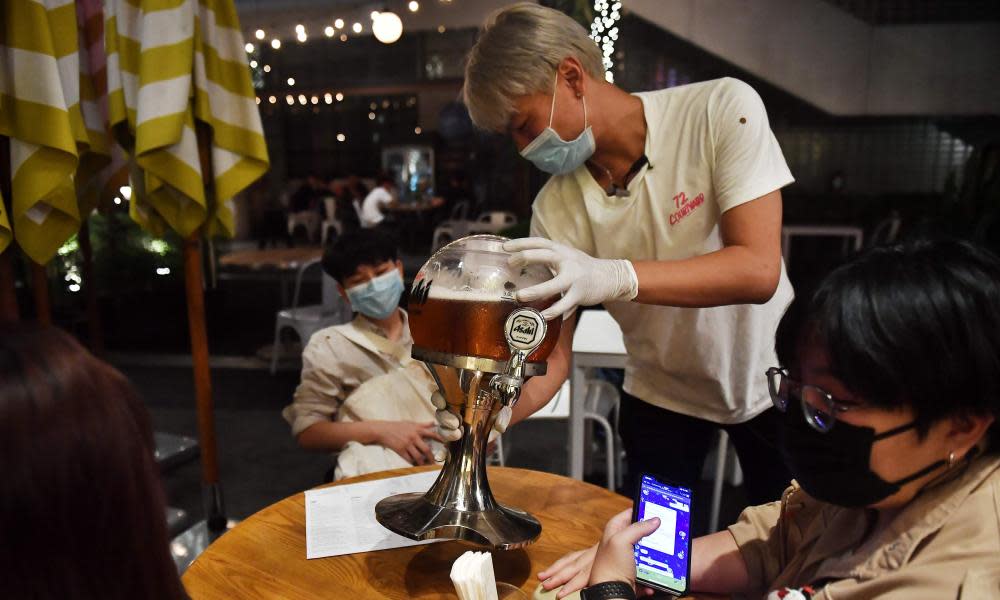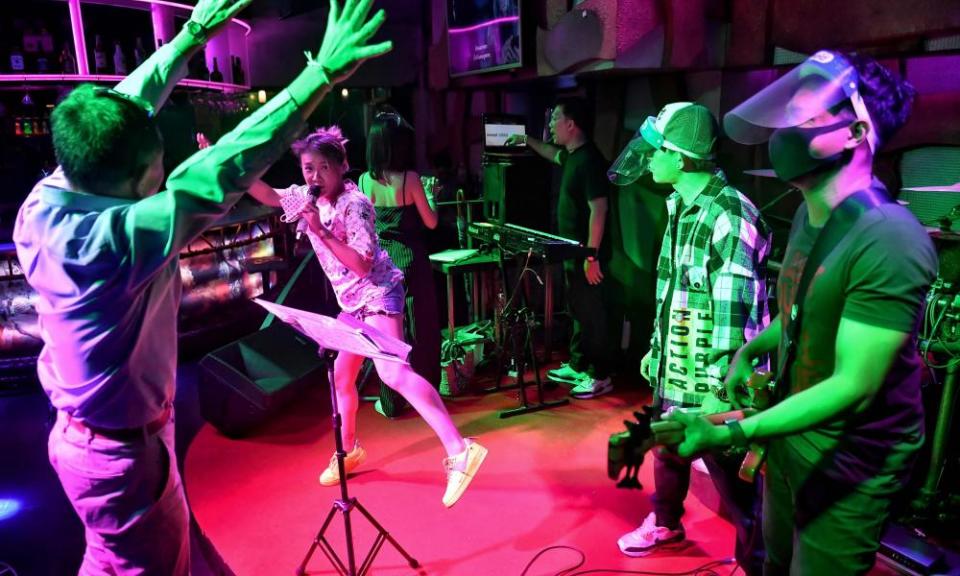'Let’s do karaoke!': Bangkok nightlife eases out of lockdown

A mix of K-pop, sweet Thai love ballads and 90s music reverberates along the corridor of one of Bangkok’s popular karaoke spots. In private rooms, parties of friends strike poses and bellow into microphones.
After three months of silence, Thailand’s nightlife was allowed to reopen on 1 July – provided venues follow government rules to prevent the spread of coronavirus. “You can dance, as long as you keep a distance from your friends,” explains Planisara Suksit, branch manager of Yes!! R&B Karaoke in Thonglor, her voice muffled by a face mask and plastic shield.
The business reopened for the first time on Friday night, operating at reduced capacity as staff rolled out new disease-control measures. Only smaller groups are allowed to book a room, guests’ temperatures are scanned, and everyone must check in through a government tracing system on their mobiles. Signs urge guests not to sit too close together. Protective covers to place over microphones are handed out.
Related: Thailand, Malaysia, Vietnam... How some countries kept Covid at bay
Everything is disinfected regularly, adds Planisara. “It’s quite a big piece of work because the decoration material in each room is different,” she says. Each space has a different theme – from likay, a form of Thai folk theatre, to a room packed with more than 100 teddy bears, some of which have been removed as a precaution.
Guests say the new measures haven’t dampened the mood. Cherwin Lee, who works in marketing, is just relieved that case numbers are low and Bangkok is opening up again. “You’ve kind of [been] deprived of it, so you think, let’s go out, let’s go out, let’s do karaoke,” he says.
The country has recorded no local cases for more than five weeks, but venues have been warned
Businesses, and the hundreds of thousands of people working in the nightlife industry, hope the sector will start to recover. It’s not possible to even think about profits yet, says Planisara. For now, the focus is adjusting to the new normal.
Social distancing will prove easier for some outlets than others. The government has allowed not just karaoke but also bars, clubs and massage parlours to reopen, and issued rules for each. Beer pitchers and singing while seated are not allowed, nor is dancing near tables in pubs and bars. In the red-light district, performers wear masks on stage, and must keep a distance from customers. Staff who provide a “soapy massage” must wear a mask, as should customers, except during bathing, the regulations state.
The country has managed to avoid a major outbreak, recording 3,185 cases and 58 deaths. But the economic impact of the lockdown has been devastating – especially for vulnerable groups such as sex workers, who rely on tourists for work. Service Workers in Group, which supports sex workers, warns some have been turned away for welfare support. Prostitution is illegal in Thailand, though it is tolerated.
It’s feared that poverty rates, which have already worsened in recent years, will rise even further. Nopadon Khanklai, a taxi driver in Bangkok, was forced to sell his car during lockdown because as work dried up, he couldn’t afford the credit payments.
“I came to a point where I had to go to the temple to ask for food. If it’s not for the temple I would have died. I had no money,” he says. Now that nightlife has reopened, he has begun driving a rented car, but this costs 700 baht (£18) per day to hire, on top of fuel. It’s hard to break even. He hopes tourists will come back soon, but worries about the risk of travellers bringing Covid-19 into the country.

Though travel bubbles with low-risk countries are being discussed by officials, borders remain shut to tourists. The country has recorded no local cases for more than five weeks, but venues have been warned that they will be closed if they break coronavirus rules.
“We try, we try,” says one business owner, who asked not to be named, but he acknowledges that it’s a challenge. At the bar, drinkers brush up against one another. Outside, groups huddle together to chat and take photos.
Maybe some people are feeling more confident because Thailand has recorded fewer cases recently, says Krittapart Ngernkao, a graphic designer, who has been out with friends.
Krittapart is still taking precautions, and says he probably won’t go out partying as often as before the coronavirus hit. But staying at home on Friday, the first day nightlife reopened, was simply not an option, he added. “We have been waiting to come out, we have been waiting for some joy.”


